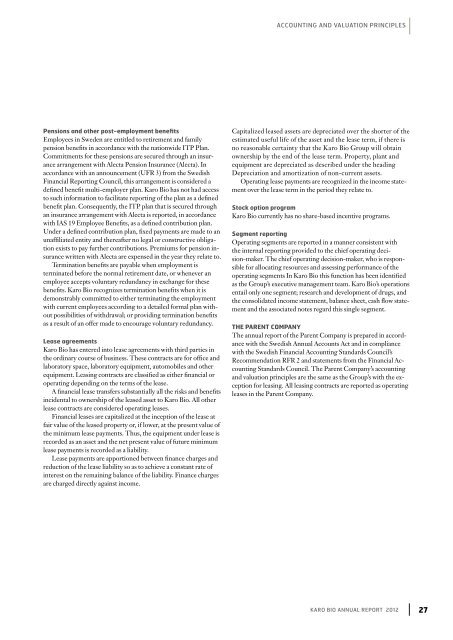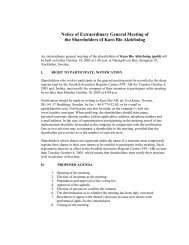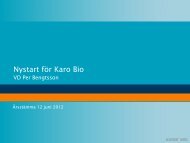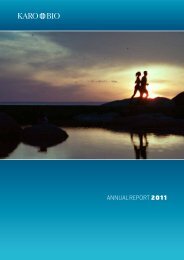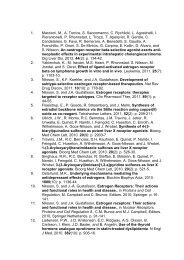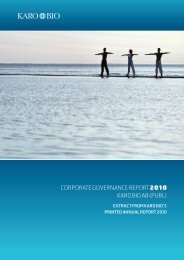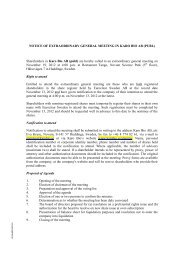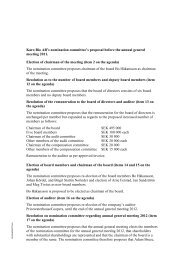Annual Report 2012.pdf - Karo Bio
Annual Report 2012.pdf - Karo Bio
Annual Report 2012.pdf - Karo Bio
Create successful ePaper yourself
Turn your PDF publications into a flip-book with our unique Google optimized e-Paper software.
Accounting and valuation principles<br />
Pensions and other post-employment benefits<br />
Employees in Sweden are entitled to retirement and family<br />
pension benefits in accordance with the nationwide ITP Plan.<br />
Commitments for these pensions are secured through an insurance<br />
arrangement with Alecta Pension Insurance (Alecta). In<br />
accordance with an announcement (UFR 3) from the Swedish<br />
Financial <strong>Report</strong>ing Council, this arrangement is considered a<br />
defined benefit multi-employer plan. <strong>Karo</strong> <strong>Bio</strong> has not had access<br />
to such information to facilitate reporting of the plan as a defined<br />
benefit plan. Consequently, the ITP plan that is secured through<br />
an insurance arrangement with Alecta is reported, in accordance<br />
with IAS 19 Employee Benefits, as a defined contribution plan.<br />
Under a defined contribution plan, fixed payments are made to an<br />
unaffiliated entity and thereafter no legal or constructive obligation<br />
exists to pay further contributions. Premiums for pension insurance<br />
written with Alecta are expensed in the year they relate to.<br />
Termination benefits are payable when employment is<br />
terminated before the normal retirement date, or whenever an<br />
employee accepts voluntary redundancy in exchange for these<br />
benefits. <strong>Karo</strong> <strong>Bio</strong> recognizes termination benefits when it is<br />
demonstrably committed to either terminating the employment<br />
with current employees according to a detailed formal plan without<br />
possibilities of withdrawal; or providing termination benefits<br />
as a result of an offer made to encourage voluntary redundancy.<br />
Lease agreements<br />
<strong>Karo</strong> <strong>Bio</strong> has entered into lease agreements with third parties in<br />
the ordinary course of business. These contracts are for office and<br />
laboratory space, laboratory equipment, automobiles and other<br />
equipment. Leasing contracts are classified as either financial or<br />
operating depending on the terms of the lease.<br />
A financial lease transfers substantially all the risks and benefits<br />
incidental to ownership of the leased asset to <strong>Karo</strong> <strong>Bio</strong>. All other<br />
lease contracts are considered operating leases.<br />
Financial leases are capitalized at the inception of the lease at<br />
fair value of the leased property or, if lower, at the present value of<br />
the minimum lease payments. Thus, the equipment under lease is<br />
recorded as an asset and the net present value of future minimum<br />
lease payments is recorded as a liability.<br />
Lease payments are apportioned between finance charges and<br />
reduction of the lease liability so as to achieve a constant rate of<br />
interest on the remaining balance of the liability. Finance charges<br />
are charged directly against income.<br />
Capitalized leased assets are depreciated over the shorter of the<br />
estimated useful life of the asset and the lease term, if there is<br />
no reasonable certainty that the <strong>Karo</strong> <strong>Bio</strong> Group will obtain<br />
ownership by the end of the lease term. Property, plant and<br />
equipment are depreciated as described under the heading<br />
Depreciation and amortization of non-current assets.<br />
Operating lease payments are recognized in the income statement<br />
over the lease term in the period they relate to.<br />
Stock option program<br />
<strong>Karo</strong> <strong>Bio</strong> currently has no share-based incentive programs.<br />
Segment reporting<br />
Operating segments are reported in a manner consistent with<br />
the internal reporting provided to the chief operating decision-maker.<br />
The chief operating decision-maker, who is responsible<br />
for allocating resources and assessing performance of the<br />
operating segments In <strong>Karo</strong> <strong>Bio</strong> this function has been identified<br />
as the Group’s executive management team. <strong>Karo</strong> <strong>Bio</strong>’s operations<br />
entail only one segment; research and development of drugs, and<br />
the consolidated income statement, balance sheet, cash flow statement<br />
and the associated notes regard this single segment.<br />
THE PARENT COMPANY<br />
The annual report of the Parent Company is prepared in accordance<br />
with the Swedish <strong>Annual</strong> Accounts Act and in compliance<br />
with the Swedish Financial Accounting Standards Council’s<br />
Recommendation RFR 2 and statements from the Financial Accounting<br />
Standards Council. The Parent Company’s accounting<br />
and valuation principles are the same as the Group’s with the exception<br />
for leasing. All leasing contracts are reported as operating<br />
leases in the Parent Company.<br />
KARO BIO <strong>Annual</strong> <strong>Report</strong> 2012 27


